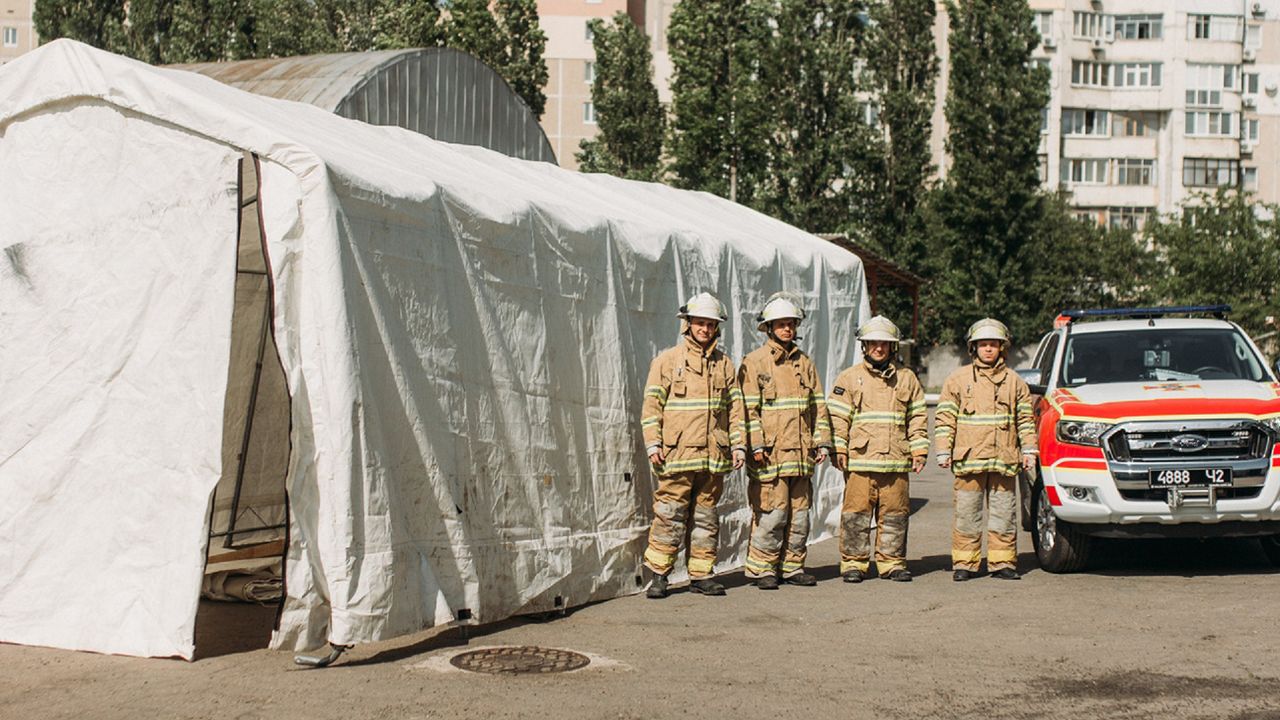CINCINNATI — Joe Elliott visited Kherson, Ukraine, in 2019 with a goal of helping to improve fire service and public safety in the country.
Now, nearly three years later, he and much of the rest of the world can’t do anything but watch as war between Ukraine and Russia rips apart communities he wanted to help serve.
“It’s absolutely devastating,” said Elliott, a Cincinnati firefighter who was last in southern Ukraine with the organization Africa Fire Mission (AFM).
What You Need To Know
- Joe Elliott and Africa Fire Mission have worked to provide equipment and training to the firefighters in Ukraine since 2019
- The war with Russia continues to affect the national fire service in Ukraine
- Elliott’s wife is from Ukraine and he’s established strong relationships with local firefighters over the past few years
- Africa Fire Mission is working to find other ways to provide resources to Ukraine firefighters during the war
Founded in 2013, AFM is a Cincinnati-based nonprofit that offers much-needed training and resources to underserved fire departments. They provide tools and protective equipment, teach emergency tactics and help with fire prevention planning.
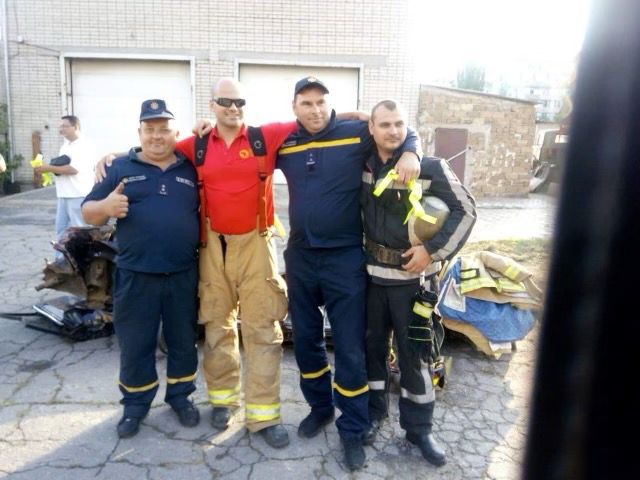
The 36-year-old first responder had traveled to Kherson and Odesa to train local residents on contemporary firefighting techniques, first aid, working with hazardous materials, and search and rescue operations.
In Ukraine, firefighters do more than just fight fires. They disarm and recover undetonated explosives — left over from previous wars — and provide psychological services to their community.
The Ukrainians also received extensive training in search and rescue efforts, something that many fire services there have made plenty of use in recent weeks.
“They’re being called into action quite a bit right now,” said Elliott, who receives “almost daily” updates from friends and first responders he’s met in Ukraine.
For Elliott, the decision to join AFM has a lot to do with his family. His wife, Yelena, 35, grew up in the Carpathian Mountain region in the southwestern corner of western Ukraine. Much of her extended family still lives there.
The couple previously traveled to Ukraine in 2017. While there, Elliott bonded with members of the nation’s fire service, including a member of his wife’s family who is a firefighter.
“This isn’t just something we’re watching on the news,” he said. “These are her family members and (friends).”
Offering aid to improve Ukraine’s fire service
AFM formally began working with the State Emergency Service of Ukraine in 2019, through its partnership with Tavriski Christian Institute (TCI), a conservative religious university.
Dave Moore, AFM’s co-founder, also has connections with Ukraine dating back to the mid-1990s. His church provided support in the initial post-Soviet era and helped form TCI, which today is fully Ukrainian run.
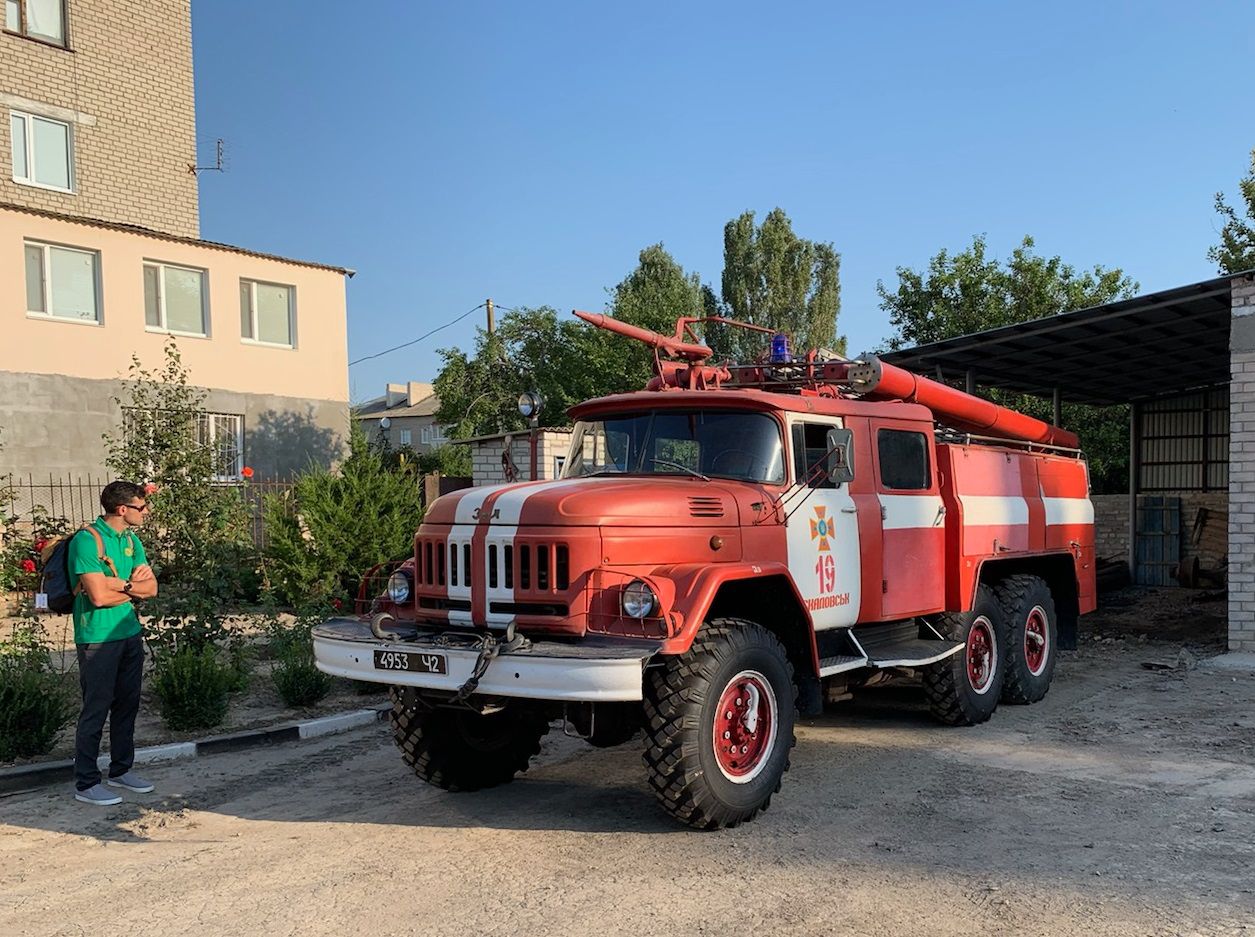
Moore’s wife Nancy, AFM’s executive director, admitted being initially skeptical about expanding outside of Africa. But “after very fruitful meetings and discussions,” they partnered with the “kind, giving, creative and brave” firefighters in Ukraine.
Overall, fire agencies in Ukraine have a good foundation, Elliott said, and large cities like Kyiv have newer tools and apparatus.
The biggest challenges are in smaller areas, like Odesa and Kherson, where AFM worked. Elliott described them as having “old school, Cold War-era equipment.”
“It was still in decent shape, but based on current fire service industry and standards, it was definitely out-of-date compared to the United States,” he explained.
Valentin Siniy, president of TCI, described some of the protective clothing worn by firefighters as similar to blue jeans and “not fireproof.”
AFM’s first shipment of fire equipment arrived in Kherson in 2019.
The 40-foot shipping container had hundreds of sets of personal protective equipment, including helmets, fire-proof jackets and boots. They also sent rescue equipment, tents, generators, oxygen tanks and a few “jaws of life” sets used for extracting people from serious vehicle collisions.
AFM also translated fire safety pamphlets for children.
Later that year, Moore — a retired fire chief in Glendale, Ohio — made a trip to Ukraine to better understand its needs. The AFM team expanded beyond Kherson to include the Kirovohrad area in central Ukraine.
Since then, AFM sent two more shipments to Ukraine — one in May 2020 and another in April 2021 — totaling 2,000 sets of firefighting equipment and other resources to the State Emergency Service.
Firefighters facing unique circumstances
TCI’s campus is in Kherson, among the first Ukrainian cities invaded by Russian forces in late February. It’s been under Russian occupation since March 2.
In recent days, residents have grown fearful as more troops advanced on the city.
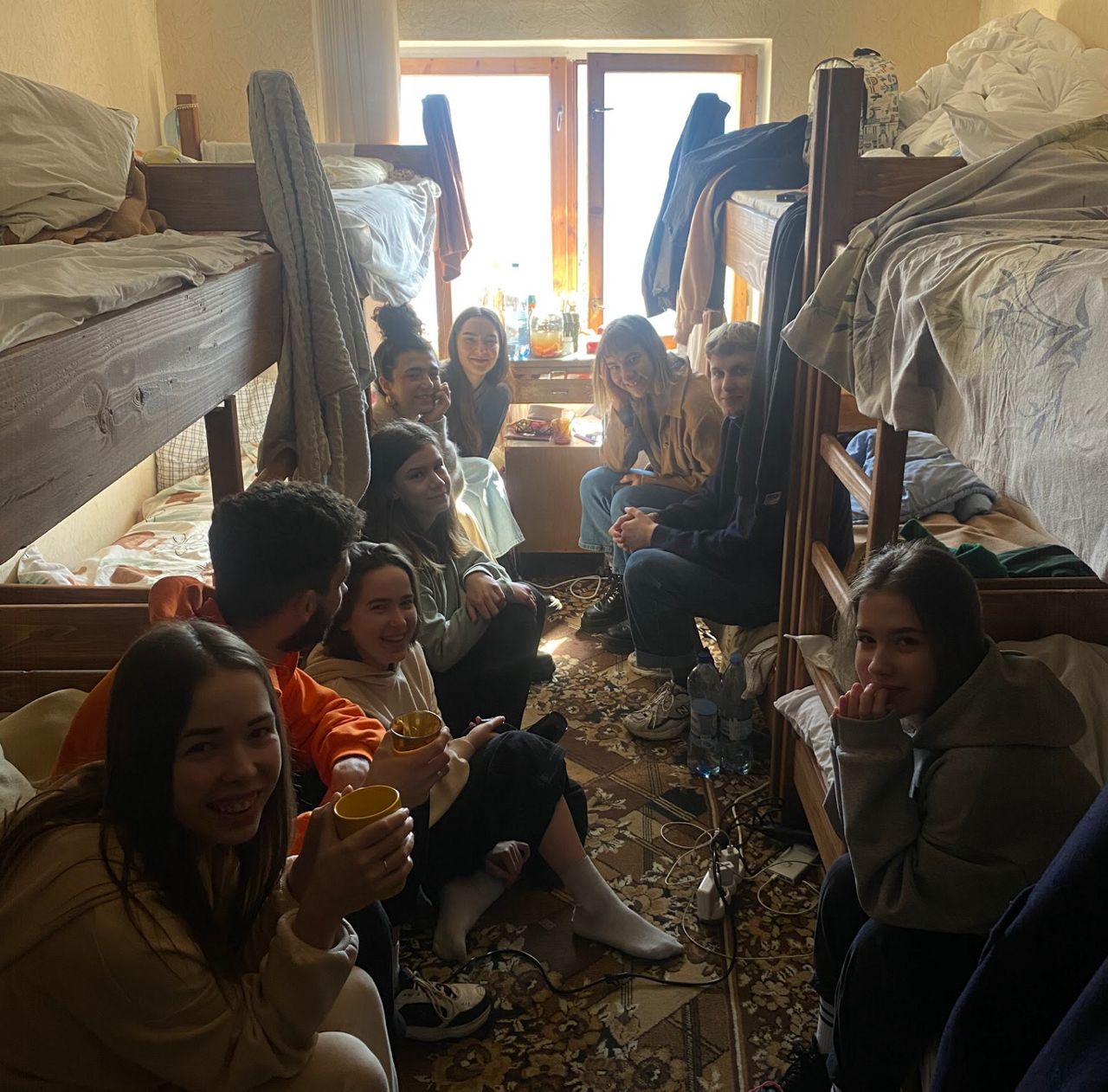
Siniy called the situation in Kherson “very difficult.” TCI’s staff and students evacuated early in the crisis, making their way to Ivano-Frankivsk in the western part of the nation. It’s relatively safe compared to the rest of Ukraine.
“There are not many bombings here,” Siniy said.
While there’s no active fighting in their temporary home, there are still challenges. Like other unoccupied areas, Ivano-Frankivsk has seen a large influx of refugees in recent weeks. TCI helps some displaced people get to Poland every week, but “more keep coming,” Siniy added.
“We provide food and temporary shelter to those who’ve just arrived,” he said. “I think the problem of housing, food and medicine is true all over Ukraine.”
In the “free territories” of Ukraine, the fire service so far continues to function normally. But it’s different in occupied areas where some firefighters may have been called to military duty.
In a village near Kherson, a local pastor and some other village people have organized a volunteer firefighter unit, Siniy said. Although it’s been able to use equipment to extinguish fires, the makeshift crew hasn’t received proper training and doesn’t have access to enough protective gear.
“This kind of situation is happening in occupied places,” Siniy said. “Because of the war, there are more fires and it is solely the volunteers who are fighting them.”
What’s next for AFM in Ukraine
TCI coordinates a lot of AFM’s on-the-ground efforts in Ukraine right now. They also host regular videoconferences with their partners.
They’re trying to get equipment and other supplies to Kherson, but that’s currently impossible because of active fighting and Russian occupation.
The situation is different in Kirovohrad: They’ve been able to support firefighters with some supplies, including food and water.
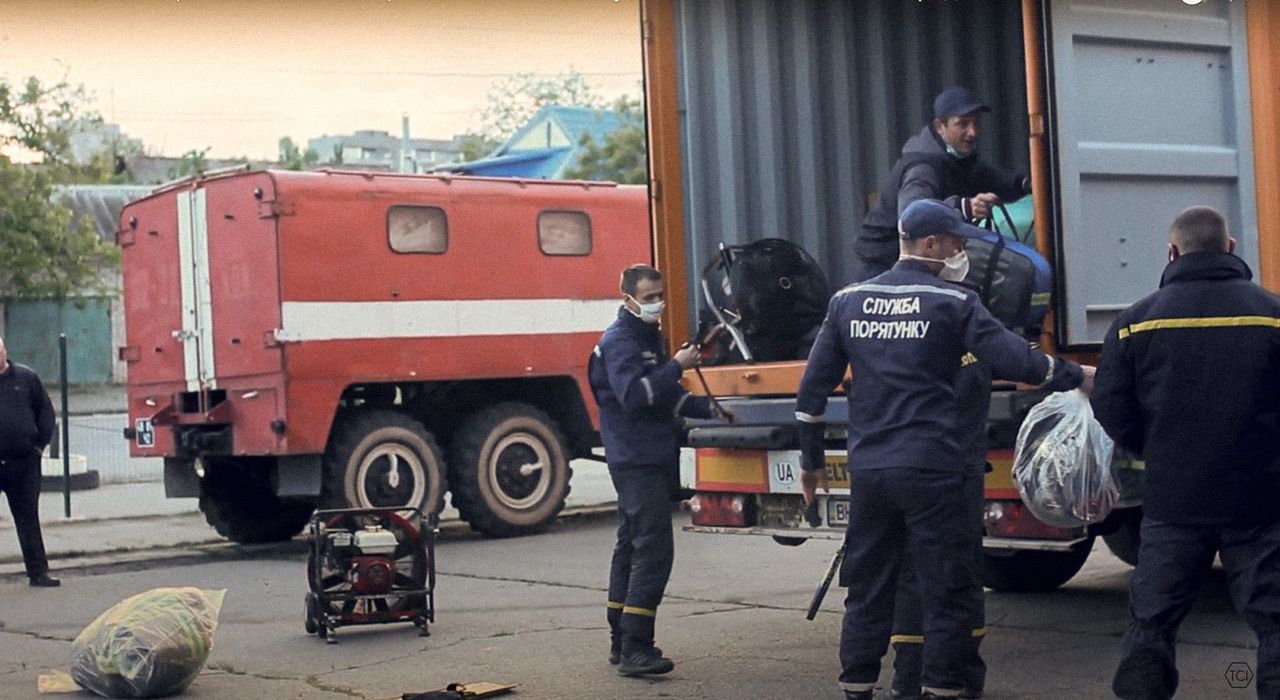
“The firefighters, just like much of the Ukrainian people, don’t have good access right now to many basic needs,” Nancy Moore said. “Through TCI, we’ve been able to get them some supplies, and we hope to continue to do that.”
Elliott called it “heartbreaking” to watch the news and see familiar buildings and places turned to piles of rubble from 5,300 miles away.
“Seeing pictures of places you’ve been fortunate enough to visit and enjoyed, have treasured memories of, turned to rubble — It’s devastating,” he said. “You desperately want to do something, anything to help, but the reality right now is we’re limited in what we can do.”
The Elliotts have had some family members escape to relative safety. One of his wife’s cousins fled to Budapest, Hungary, before relocating to Greece recently.
But others “weren’t so lucky,” Elliott said. He’s thankful everyone remains unharmed, but he knows they’re scared and unsure of what to do. He is, too.
“It’s not like picking up and going from Florida to Ohio because they’re picking up their entire lives,” Elliott said. “It’s not like you’re just going to pack up our bags and leave for a few days and come back.”
Not being able to offer immediate aid is difficult for Elliott.
“All you can do is really pray, hope and wait for the next call,” he said.
Those interested in getting involved with AFM’s efforts to serve firefighters in Ukraine can email info@africafiremission.org.



